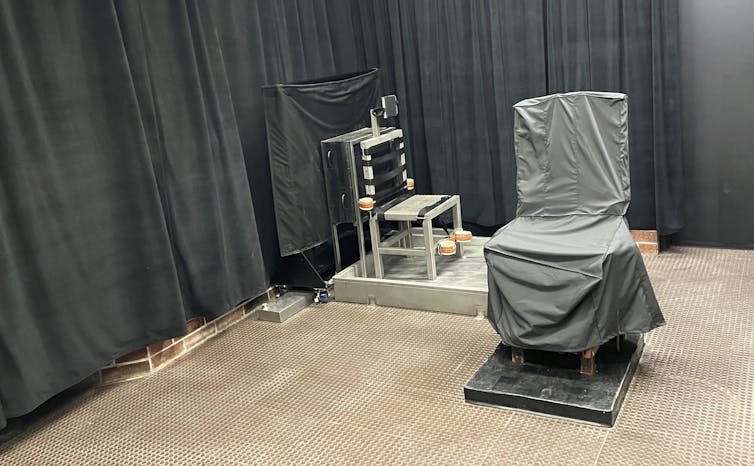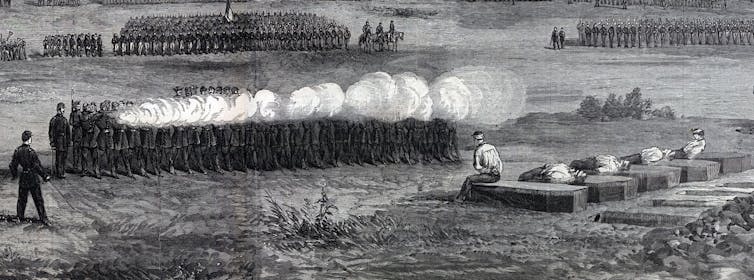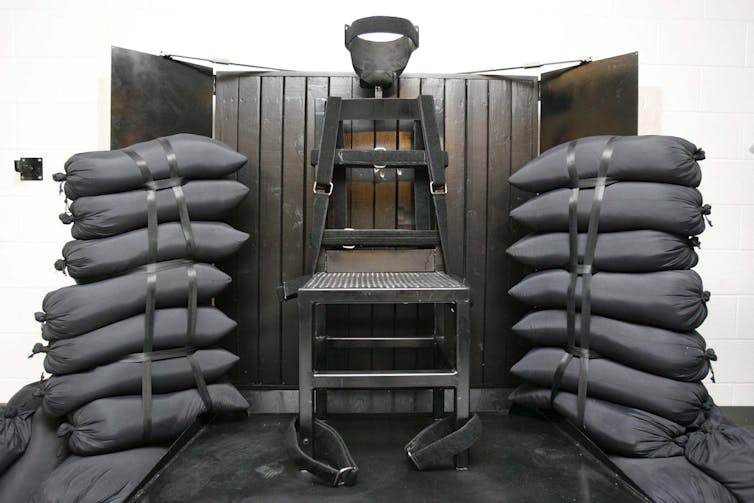In prison death chambers, the state is willing to quite literally reenact a practice from some of the country’s bloodiest history, writes Mark M. Smith.

An illustration of a deserter being executed by a firing squad at the Federal Camp in Alexandria during the American civil war. (Kean Collection/Getty Images)
By Mark M. Smith
University of South Carolina
 Americans have an appetite for reenacting the past, especially the battles of the U.S. Civil War, which took place from 1861 to 1865.
Americans have an appetite for reenacting the past, especially the battles of the U.S. Civil War, which took place from 1861 to 1865.
Every year, in an effort to relive something of the nation’s bloodiest war, thousands don blue and gray uniforms and gather on fields where the distant echoes of war have since faded.
There are dozens of Civil War reenactments in the U.S. every year. Participants take them very seriously. Food, uniforms, even the smells of war – all are recreated to lend authenticity to the events. Only the bullets and shells are not “real.”
Now, the U.S. reenactment community has a potential new member: the state of South Carolina.
That’s courtesy of the state’s decision in 2021 to allow its inmates on death row the option of execution by firing squad. With that move, South Carolina has elected to deploy a form of capital punishment not used in the state since the Civil War.

This photo provided by the South Carolina Department of Corrections shows the state’s death chamber in Columbia, S.C., including the electric chair, right, and a firing squad chair, left. (South Carolina Department of Corrections via AP, File)
Target Over His Heart
The reason South Carolina adopted the firing squad is straightforward: The state apparently has trouble securing enough lethal injection drugs to execute prisoners. That leaves the electric chair as an option. And now the firing squad.
The firing squad method has yet to be used and is currently under appeal at the state Supreme Court. I am an expert witness in this case and a historian of the Civil War.
South Carolina’s Department of Corrections has drafted firing squad protocols. The firing squad will be made up of three members drawn from prison staff. They will be behind a wall, all three of their rifles loaded with live ammunition and aimed at the inmate through an opening in the wall.
After entering the chamber, the inmate will be strapped into a chair, a hood placed over his head, and a target placed over his heart.
At this point, the warden will read the execution order aloud. Members of the squad will then fire their rifles. After the inmate is declared dead, witnesses leave.
Exclusively Military Punishment
Firing squad executions are extremely rare in U.S. history.
Only four states currently have it on the books: South Carolina, Mississippi, Oklahoma and Utah. Only Utah has used it as an actual execution method. Since 1976, just three executions have been carried out by firing squad in Utah.
Execution by firing squad has, in fact, never been common in U.S. history. While the term “firing squad” can be found in U.S. newspapers before the Civil War, the phrase was usually used to describe a different custom, akin to a salute, when guns were fired into the air to honor an individual of note after death.
The use of the firing squad was also rare during the Civil War. It was used principally to punish soldiers who deserted from either the Union or Confederate Army.

Execution of five V Corps deserters, Army of the Potomac, Virginia, Aug. 29, 1863. (House Divided: The Civil War Research Engine at Dickinson College)
According to Thomas P. Lowry and Lewis Laska’s 2009 study “Confederate Death Sentences: A Reference Guide,” of the 26,015 Union soldiers tried for desertion, approximately 1,243 of them, or 4.8 percent, were sentenced to die by firing squad; 12.4 percent of Confederate soldiers tried for desertion in the Army of Northern Virginia were sentenced to death by this method.
Besides the executions in Utah, there are no instances of the firing squad being used in the U.S. following the Civil War. It was an exclusively military form of punishment.
Because the firing squad was designed to deter deserters during the war, it was often carried out in a ritualized manner. It was almost always done publicly, and it was done with the explicit intention of instilling terror.
Then & Now
The similarities between Civil War firing squads and those proposed by the state of South Carolina are striking.
Like the guards drawn from the prison, the Civil War firing squad was selected from the ranks of soldiers. They typically carried out the punishment at the command of an assistant provost marshal or provost marshal, who is an army officer in charge of the military police.
The firing squad usually stood several feet from the condemned soldier and aimed at a target placed over his heart. In most cases, a blindfold was placed over the condemned soldier’s eyes and his hands were tied.

This June 18, 2010, photo shows the firing squad execution chamber at the Utah State Prison in Draper, Utah. (Trent Nelson/Salt Lake Tribune via AP, Pool, File)
‘The Awful Ceremony’
There were, of course, differences between then and now. Not all firing squad soldiers during the Civil War had live ammunition. One rifle could be blank, sparing even these war-hardened soldiers the knowledge of having killed an unarmed man.
In general, the firing squad took place in a public location, like a road, a town square or a battlefield. Plainly, this is not the case in the proposed South Carolina blueprint, although reporters were at the scene of Civil War executions and a member of the press will be allowed to witness firing squad executions in South Carolina.
Some comparisons remain elusive. Will the South Carolina firing squad offer an immediate, painless death? We know that Civil War firing squads were not always immediately effective. For example, according to an 1864 report of a firing squad execution published in The Vicksburg Herald, one soldier from the 49th Regiment Colored Infantry “had to be dispatched by pistol, immediate death not resulting from the wounds by the muskets.”
Will the inmate suffer psychologically and emotionally when executed in South Carolina? Again, the Civil War provides clues. Harper’s Weekly said of an 1863 mass firing squad execution: “They all suffered terribly mentally, and as they marched to their own funeral they staggered with mortal agony like a drunken man.”
Witnesses could also find the spectacle difficult to watch. According to The Louisville Daily Journal in 1863, “The scene was now becoming painful to the spectators, and many turned away, not wishing to witness more of the awful ceremony.” Sometimes soldiers charged with firing the deadly rounds deliberately missed their target, the burden of killing in this fashion proving too much.
Civil War re-enactors know the limits of what they do. They do not attempt to recreate the fatal 1864 sinking of the Confederate H.L. Hunley submarine in Charleston Harbor; neither do they attempt to recreate deadly monthlong sieges, such as the one at Vicksburg in 1863. Nor do they reenact firing squad executions.
Yet the state of South Carolina is willing to quite literally reenact a practice from some of the country’s bloodiest history — a practice that some soldiers, even in the middle of the greatest carnage this nation has experienced, found themselves unable to engage in.![]()
Mark M. Smith, Carolina distinguished professor of History, University of South Carolina.
This article is republished from The Conversation under a Creative Commons license. Read the original article.
The views expressed in this article and may or may not reflect those of Consortium News.
Support CN’s
Winter Fund Drive!
Donate securely by credit card or check by clicking the red button:


You have no right to say she has “no empathy for the victims”. What she is saying is that victims of a drone strike are also victims. You could be accused of lacking empathy yourself. Don’t forget that Obama actually joked about killing people with a drone. hxxps://www.theatlantic.com/international/archive/2010/05/obama-finds-predator-drones-hilarious/340949/
“The reason South Carolina adopted the firing squad is straightforward: The state apparently has trouble securing enough lethal injection drugs to execute prisoners. That leaves the electric chair as an option. And now the firing squad.”
Here’s another option: Stop executions altogether!
Bring back the guillotine! If you’re going to murder someone, at least make it quick and presumably painless.
I am Australian and pleased that we do not have capital punishment. I hope that the issue is never raised for consideration in the future.
The most disturbing aspect is that on rare occasions that the issue is raised in private conversation I am quietly disappointed that the number of people believe capital punishment can be justified in the most serious cases. These proponents are invariably ordinary pleasant, nice (sometimes intelligent) people who have firm views on this topic.
I am disappointed that Australia never censures the US over capital punishment but is highly critical of China and some other nations
I hope the question of capital punishment does not arise in the future as I do not trust our state and federal politicians to stand firm if they felt there were votes in changing our laws in respect to capital punishment.
I believe that all forms of capital punishment are cruel, repulsive and barbaric and should be outlawed.
But – like another commentator here – I fail to see why a firing squad is any worse than lethal injection, electric chair, hanging, gas etc. In fact, I think it is a significantly more humane method of execution than the latter methods, which subject the executed prisoner to horrendous suffering, even though they have the appearance of being more efficient and modern. Shooting is much cleaner – the prisoner dies quickly and doesn’t writhe in torment for an extended period as with lethal injections or bungled electrocutions and hangings. Although South Carolina’s protocol seems sadistically weird – shooting through a hole in a wall at a blindfolded prisoner.
Formerly, in some countries, aristocrat prisoners had the option of selecting beheading as opposed to hanging as their means of execution. Providing the prisoner a choice is at least a sign of some respect.
As the author points out with historical examples death by firing squad may not be immediate and could entail tremendous suffering.
You’re right – sorry, I had read the article too quickly and missed this.
Moral of all this: all capital punishment is dreadful and should be abandoned.
And one should also think of animals who suffer greatly through “firing squads”, aka hunting.
I have an ancestor who was executed by firing squad in Ireland by the English.
He didn’t die so they nursed him back to health and did it again.
Perhaps suicide, the way the ancient Greeks effected an execution–as in the historical case of Socrates, should be an option available to the condemned prisoner if he chooses not to slowly rot away physically and mentally over potential decades totally incarcerated, beyond the power to inflict harm upon the collective ever again. But I never did understand how or why societies take unto themselves the audacity to do what they all say that naught but God has the right to do: deliberately end the life of a fellow human being–moreover, a helpless constrained fellow being with no real power to resist their depredations ever again. I think it has nothing to do with meting out justice but merely to consolidate total control by the rulers over their citizens, subjects, residents or foreign prisoners. Did the God they profess to believe in ever sign off on such willful murder in cold blood? I mean other than in the books of fiction they consider holy writ though all ultimately penned by other mere humans? Look, they have been trying to kill Julian Assange “indirectly” via extreme stress and mental anguish for several years already, probably because, even with God in the equation, they can see how blatantly unjust, high-handed and outrageous overtly killing his biological essence would be perceived by most sane observers. Their object is always to teach US, the law abiding citizens, a lesson about THEIR omnipotence. The butchered prisoner “learns” nothing in his final experience, and God will remain whatever those really in control choose to expediently make him.
This article will serve to reinforce European prejudices about the U.S. and in blue states about the Southern U.S. Some people have no stomach for state execution of people who have committed heinous crimes. In recent years, two young women were brutally murdered by evil predators. One young woman was abducted by a predator walking along a road near tourist area Myrtle Beach. Another was a victim who got into a car with a predator assuming it was the Uber ride she had called for.
Raymond Moody, the man who confessed to killing missing teenager Brittanee Drexel in 2009 while she was on a spring break trip to Myrtle Beach, South Carolina, was sentenced to life in prison Wednesday. Moody was also sentenced to 30 years in prison for kidnapping Drexel and 30 years in prison for raping her.
Samantha Josephson, a student at University of South Carolina, in Columbia, South Carolina, occurred on March 29, 2019. Josephson, 21, had ordered an Uber and mistakenly entered a car that she thought was her ride. Nathaniel Rowland used childproof locks to prevent Josephson from leaving the vehicle and kidnapped and murdered her, leaving her body near New Zion, South Carolina – 65 miles (105 km) from Columbia, where she had entered Rowland’s car.
I would gladly fire a rifle to end the life of either predator.
The strong interest you take in these cases is kind of sick. As is your conclusion.
I see. I think The Naked Gun (1988) has the best response to your callous disregard for justice:
Frank:
I know, Ed. Life isn’t always fair. Just think. The next time I shoot someone, I could be arrested.
[he looks through his files and finds a piece of evidence]
Frank:
Hey! Look at that. The missing evidence in the Kelner case. My God! He was innocent!
Ed:
He went to the chair 2 years ago, Frank.
Ms. Turner, I am sure the families of the two homicide victims would appreciate your generous sense of humor about their horrific painful deaths. There is strong evidence connecting both of these predators to the crimes they committed. Raymond Moody confessed to raping and killing the innocent teen-aged girl, Drexel. There is conclusive evidence that Rowland murdered Josephson. I used to teach English to dangerous inmates at a maximum security prison. Even those inmates serving long sentences will tell you that there are people inside of that prison who need to be kept inside.
Mr. Suter, I consider it a civic duty to bear witness to the evil deeds of predatory miscreants. My memory is long when it comes to horrific crimes and those two stand out from the normally pastoral state of South Carolina.
I agree that predators who can’t be rehabilitated should be kept in prison for the rest of their lives. Not everyone in prison for murder are psychopaths. For example, many women who kill their psychotic abusers in self-defense end up incarcerated for decades.
All of those you mention are single murderers. The last four Commanders in Chief are “predators” responsible for the mass slaughter of millions of innocent men, women, and children, but remain free and hailed by many as great leaders. Why should they and their cohorts be treated as heroes as we condone the murder of those who’ve committed far less carnage? I don’t believe in the death penalty, as it’s purely cruel and unusual punishment, but I do believe all of those mass murderers and their accomplices should be in Guantanamo or someplace like Huntsville prison in Texas for the rest of their natural lives.
The point of a death penalty is not to inflict cruel and unusual punishment. The point is to give a predator pause before he kills or to insure that once caught, he cannot ever kill again. No disagreement from me that drone strikes are mass murder. Your belief might change if a predator killed someone you care about. With all of your empathy for the criminals, where is your empathy for the victims?
hxxps://deathpenaltyinfo.org/facts-and-research/murder-rates/murder-rate-of-death-penalty-states-compared-to-non-death-penalty-states
States without the death penalty have consistently lower murder rates than those with the death penalty. It is NOT a deterrent to murder. If a state deems it acceptable to kill people in cold blood, maybe it sends the message to its population that killing people is okay. The numbers sure seem to bear that out.
I have the utmost sympathy for the victims, but murdering their perpetrators does nothing for the victim and nothing to deter other predators. When a murderer is about to kill someone, do you really believe they have the wherewithal to consider the consequences of their actions?!
I did not say the purpose of the death penalty was to inflict cruel and unusual punishment. I said it did inflict it, which is against the Eight Amendment.
And no, I wouldn’t change my mind about the death penalty if one of my loved ones were murdered. It wouldn’t bring them back, and it would make me a murderous person to want them dead.
South Carolina is a fundamentalist Christian state, but Jesus, their Lord and Savior, said an eye for an eye was wrong. An eye for an eye leaves the whole world blind.” unknown, (but attributed to Gandhi.)
Ms. Doris, Your religious bigotry is revealed with your comment ‘South Carolina is a fundamentalist Christian state.’ Have you actually ever set foot in the state of South Carolina? Of course people have a variety of views about a subject like the death penalty. There is one indisputable fact, a predator who is put to death will never be free to harm another person again. I could suggest that you take a field trip to a maximum security prison and get to know actual predators who are incarcerated there. You might begin to grasp the evil that inhabits the minds and actions of some people. Such evil men may be difficult for some women to comprehend. There are not many of them fortunately, but they do exist. The fewer of them, the better.
All forms of capital punishment are cruel and unusual. I fail to see how a firing squad is worse than a lethal injection or the electric chair or hanging.